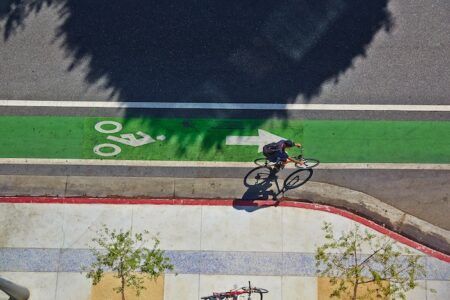German transportation software developer PTV Group has collaborated with the International Transport Forum (ITF) to model congestion and operational impacts of new curb use scenarios related to rideshare services in Lisbon’s Central Business District (CBD).
Using its traffic modeling and simulation software, PTV analyzed curb-specific impacts that stem from a growing uptake of rideshare services to help public policy define potential reallocation strategies. Published in the ITF report The Shared Use City: Managing the Curb, the results show that as rideshare adoption increases, an overall reduction in traffic delays can be expected, but only when proper management of curbside activities is implemented. The report considers the competing activities that occur along city streets and how increased levels of shared mobility, as well as urban logistics and increases in single parcel deliveries, are adding to curbside congestion. The study reveals the need to manage all competing activities, through efficiently positioned and managed pick-up and drop-off zones, as being key to maintaining smooth traffic flow.
The findings show that if no dedicated curb space is provided for pick-up/drop-off, the vehicle flow capacity reduces by up to 50%, due to the effect of double-parked rideshare vehicles causing congestion. However, the introduction of dedicated pick-up/drop-off curb space reduces delays to traffic flow in the Lisbon CBD by up to 20%. Prioritizing the allocation of curb space to rideshare activities away from existing parking spaces could result in lost parking revenue. However, analysis with PTV’s Vissim microsimulation tool demonstrates that pick-up/drop-off spaces have the potential to service over 90 transactions in an hour, compared to Lisbon’s CBD, which has one transaction per space every five hours. Implementing pricing mechanisms is therefore an important aspect to consider, whereby passengers will pay a premium to be picked up or dropped off at busy locations. This helps manage congestion, but also allows cities to recoup losses in on-street parking revenue. While allocating dedicated curb space is not feasible in all urban areas, the study highlights how the effective management of curb-space best supports the integration of large scale rideshare services on urban streets.
To determine how increased levels of shared mobility services impact curbside activity and traffic congestion, different consumer rideshare adoption scenarios were assessed with and without managed curbside space. Data extracted from the adoption scenarios provided an insight into what transitioning to new mobility services may look like. The analysis adopted a three-phase modeling system to ensure a realistic representation of traffic conditions with rideshare services. Firstly, rideshare trip requests obtained from the Lisbon mobility data was fed into PTV’s MaaS Modeler (Mobility-as-a-Service software), which optimized the dispatching and routing of the vehicle fleet to individual person trip requests. Secondly, PTV’s Visum software was used to simulate background traffic conditions of private vehicle trips. Thirdly, the detailed simulation of curbside activities, including individual vehicle behavior and interaction with the background traffic was then carried out with the company’s Vissim microsimulation software.




